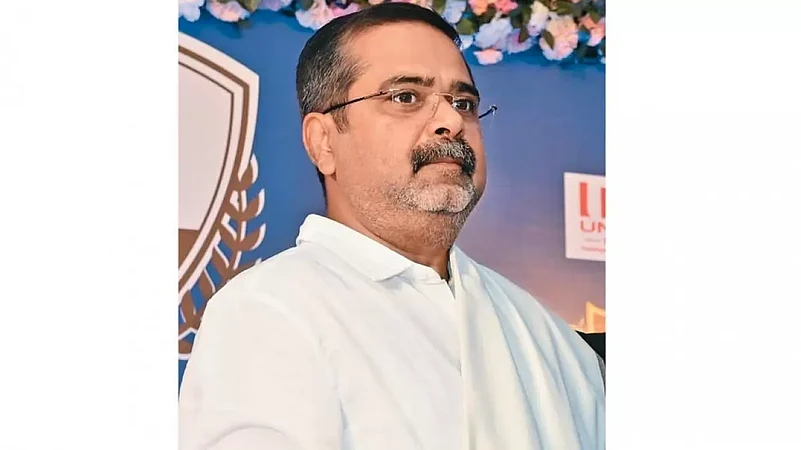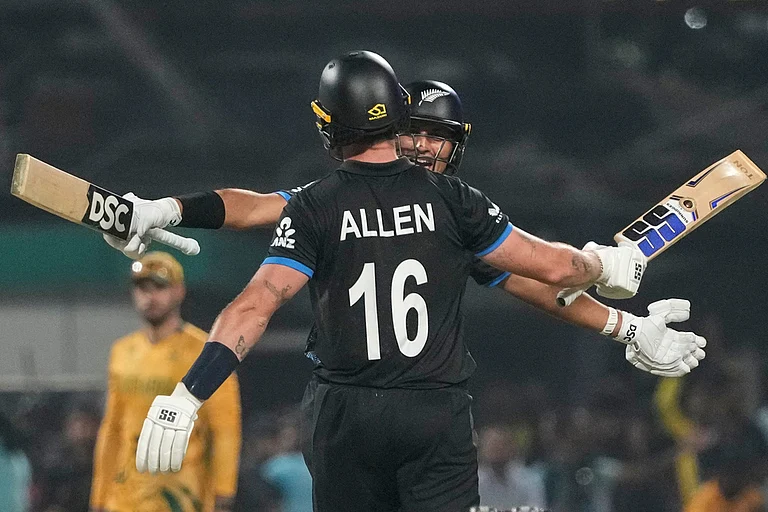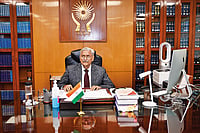Growing up in a humble family in Gonda in Uttar Pradesh, Awadh Ojha had only one dream - to become an IAS officer. Despite working hard for his goal and appearing for the Union Public Service Commission (UPSC) examination twice, Ojha failed to make the cut. Ojha's own dream may have remained incomplete. But today, the teacher is an inspiration for lakhs of students preparing for civil services examinations to fulfill their dreams of becoming an IAS.
Ojha's journey as a teacher began by coincidence. He first taught philosophy in Allahabad and later opened his own coaching centre in 2005, but he had to close it down due to financial reasons. Then, in 2010 he started a new coaching centre, which continues to this day. The offline coaching centre was not that popular before the Covid-19 pandemic. But during the lockdown, he started putting his videos on YouTube. Today, Ojha's YouTube page has about 4 lakh followers. One of his videos has a reach of millions. In conversation with Outlook's Rajiv Nayan Chaturvedi, he talks about his journey.
Edited excerpts:
Your lectures are very popular on social media. What kind of struggle did you have to go through initially?
I was okay at my studies. On someone's advice, I started preparing for civil services exams. Despite writing the mains twice, I could not make it. On someone’s advice, again, I joined teaching. I used to get only two meals a day as remuneration for teaching at that time. During the pandemic, we incurred a debt of about Rs 1.5 crore. So, I started making motivational videos and putting them on YouTube. We also uploaded some videos of Modern India. People started liking them. This is how I started.
How has your social media journey been?
I started on social media with Vajiram. At their farewell ceremonies, boys used to make videos there. One day, someone put my speech on YouTube and I started getting positive reactions from people. I didn't know anything about it but I understood it gradually. The seed that was sown in days in Vajiram became a tree in the times of Corona.
We are now in the digital era. Education is now on mobile. Good teachers are turning to online mode. Is offline education on the verge of extinction?
Never. Face-to-face communication between teacher and student is not possible in online classes. When 100-200 children are taught standing in front of the teacher, they connect with him instantly. The importance of offline classes can never go away.
What have we lost in online studies?
In an offline class, you can understand where the child's attention is. You can see if he is upset. That link has been broken in online education. Children are now lonelier. If given a chance to study offline, no one will study online. They have much more concentration when they sit and read with 100 other class mates. The same kids become casuals online.
Some teachers are doing silly things to be popular online. This raises questions about the seriousness of this medium. What do you have to say about such teachers?
One or two such people will be found everywhere. There are dozens of such people in the film world too. The same is the case in politics. People need instant attention somehow.
Earlier, teachers had less desire for name, price, fame. Today, teachers have become brands. Sometimes, they also get involved in controversy. How do you look at it?
I have coined a word 'Parasite fame’ for such a situation. If someone is very famous, has millions of followers, then a small clip of him is taken out and spread all over social media. In this way, they get good views.
When teachers become brands, what changes in the way they teach?
Nothing. I still teach the same way I taught before. Even today I go to class wearing the same kind of clothes. The acceptance of a teacher comes from his knowledge, not his glamour.
Online education has not been fully accepted in India. Your view?
When Bisleri came to India, people thought who will buy water? Here, providing drinking water to people has been considered a pious act. But today, the sale of Bisleri water is in billions. That's how everything changes. The new generation is doing everything online. In the coming 5-10 years, everyone will accept it.
What are your plans for the future?
I don't have any specific plan. I will remain in the field of education. I also intend to open a school near Allahabad.






















